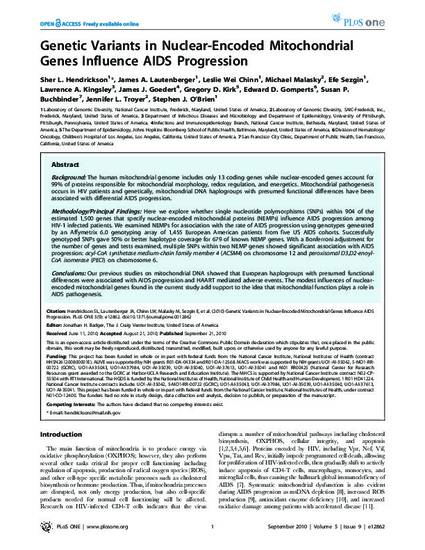
Background: The human mitochondrial genome includes only 13 coding genes while nuclear-encoded genes account for 99% of proteins responsible for mitochondrial morphology, redox regulation, and energetics. Mitochondrial pathogenesis occurs in HIV patients and genetically, mitochondrial DNA haplogroups with presumed functional differences have been associated with differential AIDS progression.
Methodology/Principal Findings: Here we explore whether single nucleotide polymorphisms (SNPs) within 904 of the estimated 1,500 genes that specify nuclear-encoded mitochondrial proteins (NEMPs) influence AIDS progression among HIV-1 infected patients. We examined NEMPs for association with the rate of AIDS progression using genotypes generated by an Affymetrix 6.0 genotyping array of 1,455 European American patients from five US AIDS cohorts. Successfully genotyped SNPs gave 50% or better haplotype coverage for 679 of known NEMP genes. With a Bonferroni adjustment for the number of genes and tests examined, multiple SNPs within two NEMP genes showed significant association with AIDS progression: acyl-CoA synthetase medium-chain family member 4 (ACSM4) on chromosome 12 and peroxisomal D3,D2-enoyl- CoA isomerase (PECI) on chromosome 6.
Conclusions: Our previous studies on mitochondrial DNA showed that European haplogroups with presumed functional differences were associated with AIDS progression and HAART mediated adverse events. The modest influences of nuclearencoded mitochondrial genes found in the current study add support to the idea that mitochondrial function plays a role in AIDS pathogenesis.
Available at: http://works.bepress.com/stephen-obrien/305/

This is an open-access article distributed under the terms of the Creative Commons Public Domain declaration which stipulates that, once placed in the public domain, this work may be freely reproduced, distributed, transmitted, modified, built upon, or otherwise used by anyone for any lawful purpose.